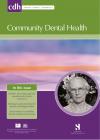Community Dental Health

- Cover Date:
- December 2011
- Print ISSN:
- 0265 539X
- Vol:
- 28
- Issue:
- 4
Why has oral health promotion and prevention failed children requiring general anaesthesia for dental extractions?
Objectives: Many children in the UK still require dental treatment under general anaesthesia (DGA). Why oral health promotion and prevention, in this cohort of children, has failed is poorly understood. By questioning the parents/carers of children undergoing DGA this study aimed to establish: 1 previous exposure to oral health education and promotion activities; 2 beliefs and behaviours about dental caries and prevention; and 3 what parents perceive useful in preventing dental caries. Basic research design: A cross-sectional questionnaire based study. Clinical setting: Dental general anaesthetic centres in Wales, UK. Participants: 207 consecutively attending parents of children aged <10 years requiring a DGA. Results: In total, 150 (76%) parents/carers claimed to have received previous oral health advice and 103 (52%) had received toothbrushing instruction from a dentist. Only 18 (9%) reported the application of topical fluoride. Sixty seven (34%) believed “tooth decay runs in families†and 53 (27%) it was simply bad luck that their child had dental decay. The majority (89%) believed that information leaflets on oral health would be useful and 133 (67%) would find information on a website helpful. Conclusions: This study suggests that there is a significant scope for increasing the exposure of high risk children to fluoride. A sense of fatalism and erroneous beliefs were evident amongst some parents/carers of children needing DGA. These issues need to be addressed in the future design of oral health promotion/prevention activities.
Key words: dental general anaesthesia, fluoride, oral health advice, oral health promotion, prevention
- Article Price
- £15.00
- Institution Article Price
- £
- Page Start
- 255
- Page End
- 258
- Authors
- A.J. Karki, D.R. Thomas, I.G. Chestnutt
Articles from this issue
- Title
- Pg. Start
- Pg. End
- Why has oral health promotion and prevention failed children requiring general anaesthesia for dental extractions?
- 255
- 258
- Predictors of utilisation of dental care services in a nationally representative sample of adults
- 269
- 273
- Applicability of both dentist and patient perceptions of dentists’ explanations to the evaluation of dentist–patient communication
- 274
- 279
- Evaluation of a preventive program based on caries risk among mentally challenged children using the Cariogram model
- 286
- 291
- The effect of a modified fluoride toothpaste technique on buccal enamel caries in adults with high caries prevalence: a 2-year clinical trial
- 292
- 296
- Association of clinical oral health status with self-rated oral health and GOHAI in Japanese adults
- 297
- 300
- Prevalence of periodontopathogens in a black Brazilian secluded community matched with a black urban population
- 301
- 304
- Incisor trauma in a Turkish preschool population: Prevalence and socio-economic risk factors
- 308
- 312
- Malocclusion and orthodontic treatment need measured by the Dental Aesthetic Index and its association with dental caries in Indian schoolchildren
- 313
- 316
